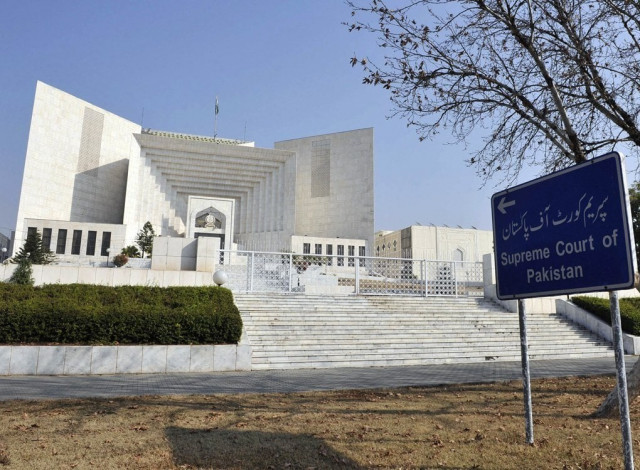SC domain can’t be extended with provincial law
Top court says only federation has legislative competence to do so

The Supreme Court has held that its jurisdiction could not be extended through provincial law but with an Act of parliament.
"The legislative competence of a provincial assembly, insofar as the jurisdiction of the courts is concerned, can reach only up to the high court concerned and no further,” read a 17-page judgment authored by Justice Munib Akhtar while examining the Khyber-Pakhtunkhwa Medical Teaching Institutions Reforms Act, 2015.
A division bench of the apex court, led by Justice Ijazul Ahsan, posed a question as to whether or not the SC could hear an appeal submitted to it under Article 212 (3) against an order of a tribunal created by a provincial law if it contradicted a proviso of that Article.
“Insofar as the jurisdiction of this court is concerned, it is only the federation that has, or can have, any legislative competence in relation thereto. The principle just stated can also be recast as follows: of the various legislatures created by the Constitution, it is only parliament that can (if at all) enact legislation that acts upon or affects the jurisdiction of this court (Supreme Court). The provincial assemblies cannot do so,” the verdict added.
The judgment read that the country’s Constitution dealt with and set up the organs of the State at both the federal and provincial levels.
It added that it divided the competence, powers and jurisdictions involved in each case both horizontally (among the various organs at a given level) and vertically (between each organ at the federal and provincial levels).
“Insofar as the judicial branch is concerned, the Supreme Court sits at the apex of the system, and in each province it is the high court that is the topmost court,” it added.
The court noted that until the changes brought by the 18th Amendment in 2010, the present Constitution had two lists, one exclusive to the federation and the other concurrent between it and the provinces.
“The relevant entry from the federal list (No 55) has been noted. Entry No 46 of the concurrent list, as was the case of the other such lists in the previous constitutional set-ups, provided for legislative competence as regarding the jurisdiction and powers of all [the] courts but expressly excluded the Supreme Court. The position therefore is clear. It is only parliament that can (if at all) enact legislation that affects or acts upon the jurisdiction of this court. The provinces have no such legislative competence," the judgment added.
The judgment read that it must be remembered, the federation could not be compelled to enact the relevant law.
"If the provincial assembly wishes to shut out every judicial remedy and leave only the route to this court, it must first pass the necessary resolution and that must then be followed up by a federal law. It is only then, and under [the] cover of an Act of parliament, that the door to this court is opened. If the provincial assembly does not wish to follow this route or parliament refuses to enact the enabling legislation in terms of the proviso, then the door to this court remains shut" the verdict read.
The court also noted the issue of setting up tribunals in relation to the district judiciaries in the provinces and the federal capital.
"The 2016 Act, in relation to the Islamabad Capital Territory, presents no difficulties. It is federal legislation and clause (2) applies in relation thereto automatically. The door to clause (3) is therefore open. However, this is not so in respect of the provincial legislation, being the 1991 K-P Act, the 1991 Punjab Act and the 2021 Balochistan Act,” the judgment added.
"The position of the tribunals set up under these laws is no different from the one set up under the 2015 K-P Act. Therefore, for the same reasons, no appeal to this court is (at present) maintainable under Article 212 (3) against [the] decisions of the respective tribunals. The position in Sindh requires separate consideration,” the verdict read.
The judgment noted that the tribunal for the district judiciary there is set up by the way of amendments to the Sindh Service Tribunals Act, 1974.
"The amendments were made by the 1991 Sindh Act, a purely amending statute. Now, the 1974 Sindh Act originally set up an administrative tribunal that is covered by the proviso in terms of the 1974 Act. Appeals from this tribunal do lie to this court in terms of Article 212 (3). What of the new tribunal created by way of insertions in the said Act? Can it have, as it were, the benefit of the cover provided by the 1974 Act? Now, the general rule relating to a purely amending statute is that it effaces itself as soon as it takes force, the amendments being immediately incorporated in the text of the law being amended,” the judgment read.
The verdict held that no appeal applied to the SC in terms of Article 212 (3) against the decision of a tribunal created by a provincial law to which the proviso to clause (2) has not been applied.
“Any such leave petitions and appeals as are pending, being not maintainable, must be returned forthwith by the office and no such leave petitions are to be entertained in future,” it noted.
The order read that leave petitions and/or appeals that had already stood decided or disposed of (including by the way of having been withdrawn or remanded or otherwise dealt with), whether by the way of a detailed judgment or a short order whether announced orally or in writing and regardless of whether in respect of any such matter detailed reasons were awaited, all such matters should be regarded as past and closed.
“The registrar shall ensure that a copy of this judgment is forthwith sent to the registrars of all tribunals to which sub-para (a) applies and the said registrars shall immediately bring it to the attention of the chairpersons and members of the said tribunals,” the verdict read.
“It shall be the responsibility of each chairperson to ensure that till such time as the proviso to clause (2) of Article 212 becomes applicable to the tribunal, the following (or similar) legend is suitably incorporated in the title page of each decision thereof for the benefit of all litigants: This tribunal is not covered by the proviso to clause (2) of Article 212 of the Constitution of the Islamic Republic of Pakistan and therefore no leave petition or appeal lies to the Hon’ble Supreme Court of Pakistan in terms of clause (3) of the said Article,” it added.



















COMMENTS
Comments are moderated and generally will be posted if they are on-topic and not abusive.
For more information, please see our Comments FAQ